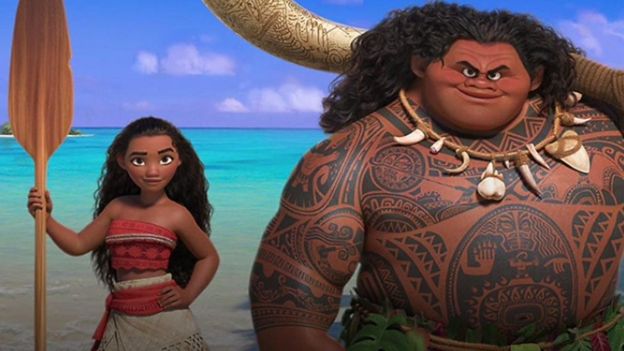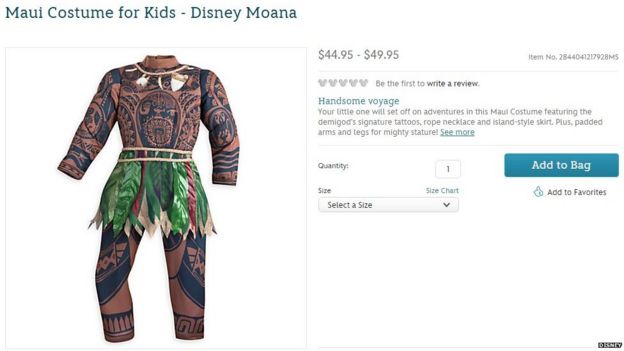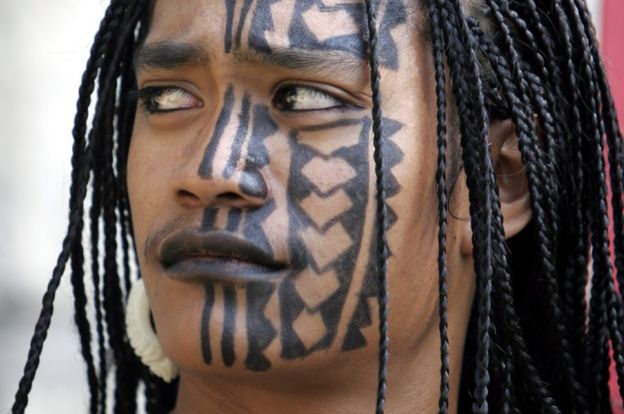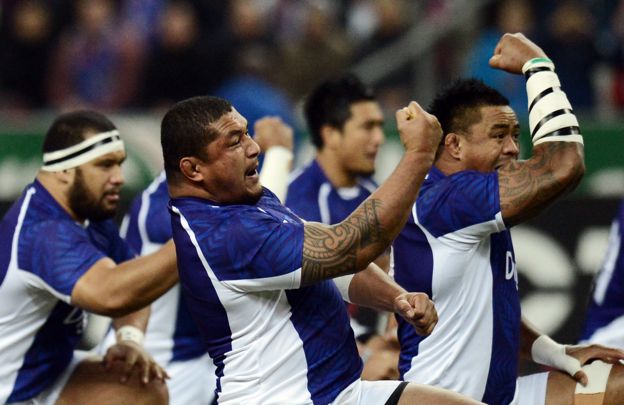How did Disney get Moana so right and Maui so wrong?
- 21 September 2016
- Asia
 DISNEY
DISNEY
A forthcoming Disney movie tells the story of Moana, a Polynesian girl who teams up with demi-god Maui to save her people. But some people have said the film and its merchandise are appropriating Samoan culture.
Arieta Rika, who founded a website called Talanoa as a home for Pacific stories, told the BBC how she wants her culture to be celebrated.
As a Pacific person, I can't tell you how excited I am to see this movie. Seeing faces that look like mine, telling a story that relates to me. I just don't have the words.
I haven't felt this excited about a Disney film in decades.
I am excited that the film has given a voice to many Pacific people who might have otherwise gone unheard when discussing issues about culture, people and place in the context of the Pacific and our stories.
It has also raised important questions about cultural appropriation and misappropriation. Is Disney doing it right?
Is there a way to celebrate Moana and Pacific culture, without offending Pacific people?
What is Moana?
- The second Disney film set in the Pacific Islands (after Lilo and Stitch, set in Hawaii)
- The story of a Polynesian girl who teams up with a Samoan demi-god Maui to go on a quest and save her people
- Maui - voiced by Dwayne Johnson, stage name The Rock - is based on a Polynesian legend
- According to myth, Maui created the Pacific Islands by fishing them from the sea
I've yet to watch the movie, but so far, it looks like Disney has applied four important aspects of Pacific culture: awareness, context, relationship and respect.
This week, Disney released a children's costume for Maui, a character in the Moana film. I get it - Disney knows and appreciates that children across the world will fall in love with Maui, and like many other Disney characters, they'll want nothing more than to look exactly like him.
 DISNEY
DISNEY
On paper, it seems like a pretty logical decision to create a costume.
There is not much to work with in terms of clothes though, as he only wears a grass skirt and a necklace made of shells. Hence the final product that Disney released - a body suit with brown skin, tattoos, Maui's necklace, and a grass skirt.
In reality, it has offended many Pacific people. I understand the reasoning behind the grass skirt and the necklace, but the brown skin is too far, and the tattoos are culturally misappropriated.
Tattoos are deeply meaningful to Pacific people. Like a fingerprint, a tattoo is unique to each person.
Our markings tell a personal story that we carry with us on our skin, everywhere we go - constantly reminding us of our values, our people, and our identity.
 GETTY IMAGES
GETTY IMAGES
It is considered taboo and extremely disrespectful in many Pacific cultures to wear the markings of a people or place that you are not spiritually or physically connected to. After the release of Moana, Maui may be a Disney character to some, but to many Pacific people, he is very real - a hero, ancestor, demi-God and a spiritual guide.
Even for Pacific people who don't believe in Maui, replicating a Polynesian tattoo and offering it to children for a price is belittling and trivializing an intimate aspect of Pacific people and culture.
Knowing this, Disney could have reconsidered their decision to include tattoos on Maui's costume. That would have also eliminated the need for the brown skin body suit that many consider "brownface". They also would have anticipated the backlash from Pacific people who interpret their decision as inappropriate and disrespectful at best - and at worst, a way to make money from a particularly significant aspect of Pacific culture.
 GETTY IMAGES
GETTY IMAGES
You need not be a Pacific person to enjoy and respect Moana, Maui and Pacific culture. Many Pacific people welcome questions. Taking initiative and starting these conversations creates trust, shows respect and ultimately, could be the start of a meaningful relationship between you and Pacific culture, and a Pacific person.
In the meantime, I will be eagerly waiting for the release of Moana. If anything, I appreciate the opportunity it is giving me and many other Pacific people to share our thoughts, our opinions, and our stories.
After all, having these conversations on a global scale is important, and it is what I and many Pacific people who have gone before me have been waiting for, for centuries.
No comments:
Post a Comment